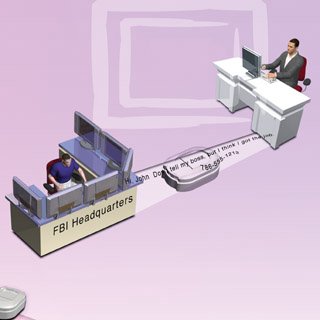Chapter 29. How Wiretapping and Lie Detectors Work
| Throughout the history of the United States, one of the greatest political tensions has been that which balances personal privacy against the need for law enforcement to protect individuals and the country as a whole. That tension has been with us from the very earliest days of the Republic. The Founding Fathers were extremely cognizant of it, and the Bill of Rights was, to a certain extent, a way to balance the rights of privacy against the rights of the federal government that was outlined in the U.S. Constitution. The world is a more dangerous place than it was in the late eighteenth century, and technology has made it far easier than ever before for law enforcement to investigate personal details of people's lives. Two of the most controversial techniques used by law enforcement are wiretapping and lie detectors, formally called polygraphs. Both of these techniques invade people's privacy yet are also needed by law enforcement personnel to stop and solve crimes. Wiretapping is the more controversial of the two because of its intrusive nature. It allows law enforcement to listen in on all of a person's conversations via telephone and to tape those conversations. Because of the intrusive nature of wiretaps, wiretaps typically require that law enforcement personnel first go to a judge before a tap can be installed, and reasons must be shown why the tap is necessary. Different judges interpret the laws and needs for taps differently, so some judges are more likely to issue taps than others. The passage of the controversial U.S. Patriot Act expanded and loosened the use of wiretaps, though. Critics say that this act allows the government to ask for taps on literally anyone in the country, not just those suspected of crimes. The law does not require that the government show that the person for which it is requesting the tap actually be relevant to a criminal investigation. In addition, it expands the definition of a wiretap, so that multiple telephones can be tapped if it is suspected the person being tapped may use more than one telephone. Lie detector tests, formally called polygraphs, are controversial for a different reason. In the public imagination, lie detector tests are scientifically rock-solid and can provide definitive proof of a person's guilt or innocence or whether a person is lying in answer to questions. In real life, though, things are not so cut and dried. The tests rely on a trained person to interpret the results and are notoriously inaccurate. It is easy to get false positives and false negatives. In addition, people can use a variety of techniques to fool the tests. Because of that, the tests are usually inadmissible in court. But they are still used and are sometimes used by private businesses that ask people to take lie detector tests before being hired. |
EAN: 2147483647
Pages: 161
